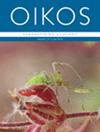人口和气候影响自由活动灵长类种群 60 年来按性别划分的生殖存活成本
IF 3
2区 环境科学与生态学
Q2 ECOLOGY
引用次数: 0
摘要
在季节性繁殖的物种中,繁殖与生存之间的生命史权衡往往导致雄性和雌性死亡风险峰值的时间不一致。由于人类活动正在推动全球气候和种群结构的快速变化,了解个体年龄、人口和气候如何影响繁殖投资和生存之间的季节性关联变得越来越重要。我们利用从一个自由活动的猕猴种群(n = 1919 只雄性猕猴,1609 只雌性猕猴)收集到的 60 年人口记录,研究了季节性繁殖投资和存活率之间的权衡是如何随着观察到的人口和气候的变化而波动的。在这 60 年间,雄性和雌性猕猴的季节性死亡率都有显著波动。雄性(而非雌性)的特定年龄存活率在低生殖投资期和高生殖投资期有所不同,这表明雄性在生殖和存活之间的权衡尤其取决于年龄。几乎没有证据表明性别比对雄性和雌性的存活率有影响。在雄性和雌性中,较高的种群密度与较低的存活率相关,而且密度的负面影响在雄性和雌性的低生殖投资期尤为明显。虽然没有证据表明在低繁殖投资期温度对雌性存活率有影响,但在高繁殖投资期,日平均最高气温与雌性存活率呈正相关。降雨量越大,雌性存活率越高,降雨量对雌性存活率的积极影响在低繁殖投资期尤为明显。相反,温度或降雨量对雄性存活率没有影响。这项研究的结果表明,气候和人口因素对不同性别在不同生殖投资期的死亡率有很大影响。本文章由计算机程序翻译,如有差异,请以英文原文为准。
Demography and climate influence sex‐specific survival costs of reproduction over 60 years in a free ranging primate population
The life‐history tradeoff between reproduction and survival often results in a discordant timing of peak mortality risk for males and females in seasonally reproducing species. Understanding how this seasonal association between reproductive investment and survival is impacted by individual age, demography, and climate is increasingly important as anthropogenic influence is driving rapid global climate and population structure changes. We investigate how tradeoffs between seasonal reproductive investment and survival have fluctuated in response to observed changes in demography and climate using 60 years of demographic records collected from a free‐ranging population of rhesus macaques Macaca mulatta (n = 1919 males, 1609 females). Seasonal mortality rates fluctuated significantly over the 60‐year period for both males and females. In males, but not females, age‐specific survival was different during periods of low and high reproductive investment, indicating that tradeoffs between reproduction and survival are particularly age‐dependent in males. There was no little to no evidence for an effect of sex ratio on survival in either sex. In both sexes, higher population density was associated with lower survival, and this negative effect of density was particularly strong during each sex's period of low reproductive investment. While there was no evidence for an effect of temperature on female survival during periods of low reproductive investment, during periods of high reproductive investment there was a positive association between average daily temperature maximum and female survival. Female survival was higher overall when rainfall was greater, and this positive effect of rainfall on survival was particularly strong for females during periods of low reproductive investment. Conversely, there were no effects of temperature or rainfall on male survival. The results of this study illustrate the considerable ways that climatic and demographic factors can influence sex‐specific mortality during each sex's distinct periods of reproductive investment.
求助全文
通过发布文献求助,成功后即可免费获取论文全文。
去求助
来源期刊

Oikos
环境科学-生态学
CiteScore
6.20
自引率
5.90%
发文量
152
审稿时长
6-12 weeks
期刊介绍:
Oikos publishes original and innovative research on all aspects of ecology, defined as organism-environment interactions at various spatiotemporal scales, so including macroecology and evolutionary ecology. Emphasis is on theoretical and empirical work aimed at generalization and synthesis across taxa, systems and ecological disciplines. Papers can contribute to new developments in ecology by reporting novel theory or critical empirical results, and "synthesis" can include developing new theory, tests of general hypotheses, or bringing together established or emerging areas of ecology. Confirming or extending the established literature, by for example showing results that are novel for a new taxon, or purely applied research, is given low priority.
 求助内容:
求助内容: 应助结果提醒方式:
应助结果提醒方式:


